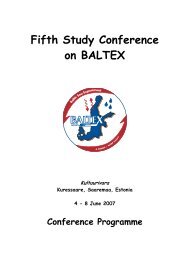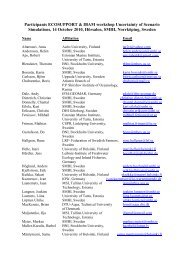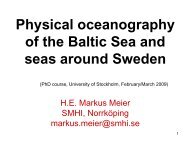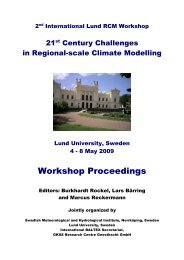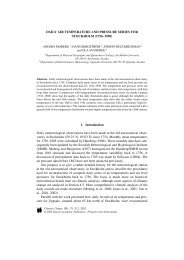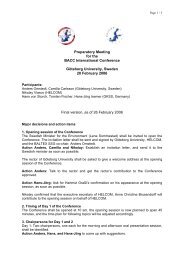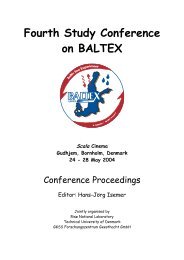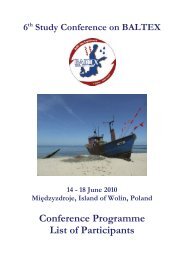BALTEX Phase II 2003 â 2012. Science Framework and ...
BALTEX Phase II 2003 â 2012. Science Framework and ...
BALTEX Phase II 2003 â 2012. Science Framework and ...
You also want an ePaper? Increase the reach of your titles
YUMPU automatically turns print PDFs into web optimized ePapers that Google loves.
<strong>BALTEX</strong> <strong>Phase</strong> <strong>II</strong> <strong>Science</strong> <strong>Framework</strong> <strong>and</strong> Implementation Strategy 33<br />
2.4.4. Assessment of Climate Change for the Baltic Sea Basin<br />
While the above three activity areas deal with the elaboration of new knowledge, provide new data<br />
sets <strong>and</strong> new applications of dynamical models, this fourth activity area aims at a consolidation <strong>and</strong><br />
integration of distributed, already existing knowledge about historical <strong>and</strong> current (1800–today)<br />
change <strong>and</strong> expected future changes. It assembles, integrates <strong>and</strong> assesses available knowledge of the<br />
ongoing climate change <strong>and</strong> its impacts in the Baltic Sea basin. As such, the activity contributes both<br />
to IPCC <strong>and</strong> now also to HELCOM (The Baltic Marine Environment Protection Commission), see<br />
below. The work will be structured in subsections dealing with (i) historical <strong>and</strong> current change,<br />
detection <strong>and</strong> attribution, (ii) expected <strong>and</strong> possible climate change <strong>and</strong> (iii) the impact of climate<br />
change on both marine <strong>and</strong> terrestrial ecosystems, <strong>and</strong> more generally, (iv) on the regional<br />
environment <strong>and</strong> society. A concrete initiative for a <strong>BALTEX</strong> Assessment of Climate Change for the<br />
Baltic Sea Basin (BACC) has already been initiated in 2004 with the aim to publish a comprehensive<br />
assessment book by the year 2006. BACC/<strong>BALTEX</strong> has also undertaken to establish a joint venture<br />
with HELCOM in the sense, that the BACC material will be used for a two-volume HELCOM<br />
Thematic Assessment Report, to be published in 2006 <strong>and</strong> 2007. This potential activity is also seen as<br />
one important example for knowledge integration in <strong>BALTEX</strong>, see Chapter 7.2.<br />
2.5. Specific Data Needs<br />
Both instrumental <strong>and</strong> proxy data from the past <strong>and</strong> recent <strong>and</strong> ongoing monitoring need to be<br />
extended <strong>and</strong> continued, respectively. Further work is needed to compile <strong>and</strong> analyse data on state<br />
variables. Where possible, efforts should be spent to attain more information on budgets <strong>and</strong> at<br />
process-level, i.e. on fluxes. Use of climate information from remote sensing platforms, such as<br />
operational European environmental satellites should be explored also in climate variability <strong>and</strong><br />
change studies.<br />
Increasing availability of new data sets <strong>and</strong> products from the Satellite Application Facilities (SAF) of<br />
the European Organisation for the Exploitation of Meteorological Satellites (EUMETSAT) can<br />
become an asset. A wealth of information is available from the European Centre for Medium-Range<br />
Weather Forecasts (ECMWF) re-analysis <strong>and</strong> analysis products, especially for the study of indicators<br />
<strong>and</strong> detection. The various <strong>BALTEX</strong> Data Centres (Chapter 8.1) should be further developed to offer<br />
additional resources for climate studies, <strong>and</strong> storage of even regional re-analysis data, such as<br />
downscaled global re-analysis, as it becomes available, should be pursued.<br />
Other specific data needs are global climate simulations which have to be analysed <strong>and</strong> to be used to<br />
force regional dynamical <strong>and</strong> statistical downscaling models. Even the early part of the period in focus<br />
might be probed in such a way, <strong>and</strong> the access to <strong>and</strong> availability of data from proxy archives is to be<br />
improved for the same part of the period.




